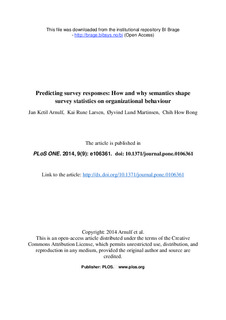| dc.contributor.author | Arnulf, Jan Ketil | |
| dc.contributor.author | Larsen, Kai Rune | |
| dc.contributor.author | Martinsen, Øyvind Lund | |
| dc.contributor.author | Bong, Chih How | |
| dc.date.accessioned | 2015-03-20T13:58:11Z | |
| dc.date.available | 2015-03-20T13:58:11Z | |
| dc.date.issued | 2014 | |
| dc.identifier.citation | PLoS ONE. 2014, 9(9): e106361. doi: 10.1371/journal.pone.0106361 | nb_NO |
| dc.identifier.issn | 1932-6203 | |
| dc.identifier.uri | http://hdl.handle.net/11250/280035 | |
| dc.description | This is the originally published version of the article. The journal is Open Access, available at www.plos.org | nb_NO |
| dc.description.abstract | Some disciplines in the social sciences rely heavily on collecting survey responses to detect empirical relationships among variables. We explored whether these relationships were a priori predictable from the semantic properties of the survey items, using language processing algorithms which are now available as new research methods. Language processing algorithms were used to calculate the semantic similarity among all items in state-of-the-art surveys from Organisational Behaviour research. These surveys covered areas such as transformational leadership, work motivation and work outcomes. This information was used to explain and predict the response patterns from real subjects. Semantic algorithms explained 60–86% of the variance in the response patterns and allowed remarkably precise prediction of survey responses from humans, except in a personality test. Even the relationships between independent and their purported dependent variables were accurately predicted. This raises concern about the empirical nature of data collected through some surveys if results are already given a priori through the way subjects are being asked. Survey response patterns seem heavily determined by semantics. Language algorithms may suggest these prior to administering a survey. This study suggests that semantic algorithms are becoming new tools for the social sciences, opening perspectives on survey responses that prevalent psychometric theory cannot explain. | nb_NO |
| dc.language.iso | eng | nb_NO |
| dc.publisher | Plos | nb_NO |
| dc.title | Predicting survey responses: How and why semantics shape survey statistics on organizational behaviour | nb_NO |
| dc.type | Journal article | nb_NO |
| dc.type | Peer reviewed | nb_NO |
| dc.subject.nsi | VDP::Social science: 200::Psychology: 260::Organizational psychology: 268 | nb_NO |
| dc.source.journal | PLoS ONE | nb_NO |
| dc.identifier.doi | 10.1371/journal.pone.0106361 | |
| dc.description.localcode | 1, OA | nb_NO |
